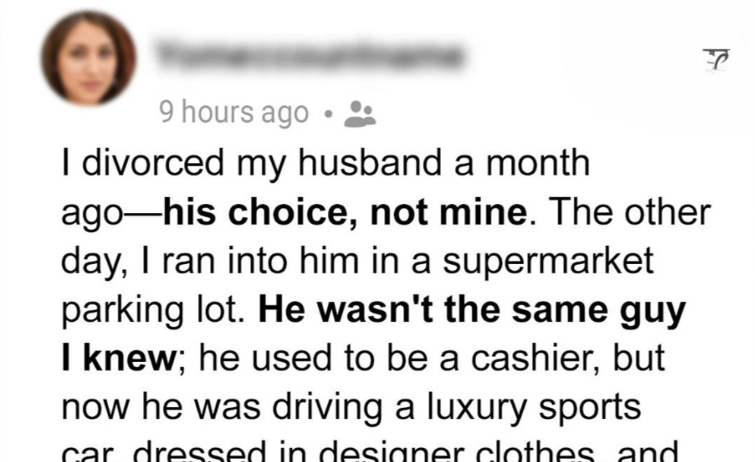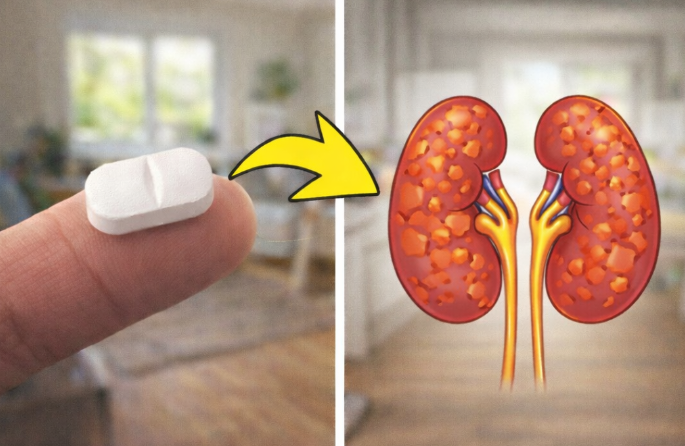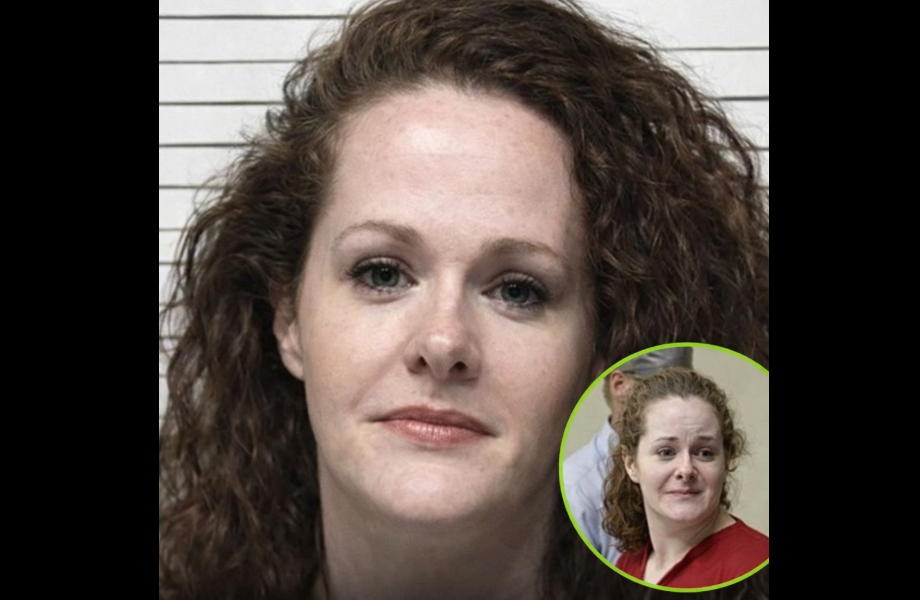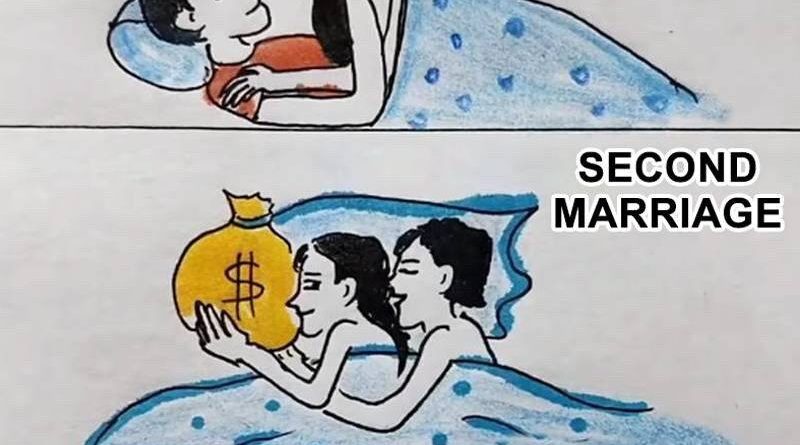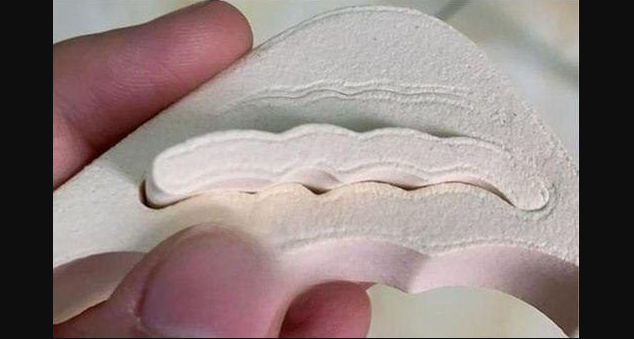A month ago, my marriage to my husband ended—his decision, not mine. Recently, I crossed paths with him in a supermarket parking lot.
He was unrecognizable from the man I once knew; he had been a cashier, but now he drove a sleek sports car, wore designer outfits, and sported a high-end watch.
I offered kindness and said, “Wow, you’re thriving! Congratulations!” His reply was cold: “None of your concern.”
Then he flicked a hundred-dollar bill out his window and sped away. What he didn’t realize? I was on the verge of uncovering the true source of his wealth—and that it rightfully belonged to me.
I returned home trembling. My hands shook as I unlocked my apartment door. The space felt colder, emptier than ever. It wasn’t merely the absence of his belongings; it felt as though he’d drained the warmth from my life when he left.
My friend Seraphine had urged me to move forward, to embrace a new chapter. Yet seeing him parade his newfound wealth tore open every scar. Something about his sudden fortune—its abruptness—felt deeply wrong.
I recalled the night he stormed out. We’d clashed over his “business trips” that never made sense. He called me paranoid. The next day, he demanded a divorce. So sudden, so final.
During our marriage, I handled our finances. I knew every cent we had—and we were buried in debt when he left. He’d run up our credit cards, forcing me to take extra shifts at the diner to cover rent.
So how had he transformed from penniless to prosperous overnight?
That evening, I sifted through old bank statements stored in a shoebox beneath my bed. One detail caught my eye: a $50,000 transfer made days before he left, to an account I didn’t recognize.
The bank refused to share details since the account wasn’t mine. But I wasn’t ready to drop it. I contacted a friend, Anton, who worked at the bank and owed me a favor after I helped him move last summer.
Anton agreed to investigate. Two days later, he called, his voice low.
“Joya, this is serious. That account belongs to Frieda Melrose, an eighty-year-old woman. She reported missing money last month.”
Nausea hit me. Frieda Melrose was a kind elderly woman I’d delivered groceries to occasionally. She was nearly blind, dependent on neighbors for help. My ex had preyed on her.
“Can you confirm it was him?” I asked Anton, my voice breaking.
“There’s a withdrawal slip with his signature,” Anton murmured. “He forged her authorization.”
My stomach churned. He’d stolen from a vulnerable woman and was now tossing hundred-dollar bills like they were nothing.
I knew confronting him alone was risky. I’d witnessed his rage during our marriage—once, he smashed a hole in the bathroom door because I questioned his whereabouts.
I chose to visit Frieda. When she opened her door, her cloudy eyes brightened at the sound of my voice.
“Joya! It’s been too long, dear,” she said, clutching my hand.
I shared what I’d discovered. Tears filled her eyes. “I thought I was losing my mind,” she whispered. “I told the bank, but they didn’t take me seriously.”
I vowed to make things right for her.
The next morning, I went to the police with Frieda and Anton’s documents. Officer Dawkins, a sharp, no-nonsense detective, listened intently as I explained everything.
She revealed they’d been investigating similar thefts targeting seniors in our area but lacked leads—until now.
A week later, I sat at the diner counter, staring into my coffee, when my phone rang. It was Officer Dawkins.
“Joya, we’ve arrested your ex-husband. He admitted to stealing nearly $200,000 from elderly victims, including Frieda.”
My heart sank. Relief and fury tangled inside me. I felt validated, but also horrified by how low he’d stooped.
The detective assured me they’d work to recover the money and return it to the victims. She thanked me for coming forward, noting that without my evidence, he might have continued undetected.
At home, I collapsed onto my couch and let the tears flow. I wept for the woman I once was—the one who trusted him blindly. I wept for Frieda and the others he’d harmed.
Then something unexpected happened. The next day, Frieda’s niece appeared at my door with a basket of muffins and an envelope. Inside was a note from Frieda: “You saved me. Please accept this as my thanks.”
Enclosed was a $5,000 check. I tried to decline, but her niece insisted. “You’ve earned it,” she said.
That money didn’t make me wealthy, but it offered relief. I cleared the credit card debt he’d left behind and paid three months’ rent in advance. For the first time in years, I could look ahead instead of being trapped in the past.
But there was more. News of my actions spread through our community. One day, the diner’s owner, Mr. Gavril, called me into his office. My heart pounded—I feared I was in trouble.
Instead, he said, “Joya, I heard what you did for Frieda. That kind of integrity and bravery is rare. I’d like to offer you a management position.”
I was stunned. A raise, benefits, and steady hours—it was everything I’d hoped for.
A month later, I moved into a brighter apartment near the diner. My life wasn’t flawless, but it was mine again. I began volunteering at a senior center on weekends, teaching basic phone skills to help protect against scams.
One Saturday, I saw Frieda there, chuckling as she mastered her new smartphone. She called me her “angel.”
In that moment, I knew every hardship had led me here.
I also found a new circle of friends at the center. They supported me without prying into my past or questioning my failed marriage. They simply accepted me.
Occasionally, I’d hear from people who knew my ex. They mentioned his five-year prison sentence. Some asked if I felt sorry for him. I didn’t. Not at all.
I found peace knowing justice had prevailed. He faced the consequences, and his victims were finding closure.
The greatest revelation was my own strength. All those sleepless nights, blaming myself for his betrayal—it was never my fault.
It was him. His actions. His deceit.
And I was finally free.
One evening, on my balcony, watching the sunset, a calm settled over me. I thought of the old me—timid, self-doubting.
I whispered to the breeze, “Thank you.” Without that pain, I wouldn’t have discovered my resilience.
The town began to see me differently—not as “the woman he left,” but as someone who stood for justice.
One day, Frieda’s niece introduced me to her friend Phineas, a kind carpenter. We met for coffee, and I found myself opening up without hesitation.
We took our time. He listened to my story without judgment. We enjoyed long walks, shared home-cooked meals, and he brought laughter back into my life.
Three months later, he crafted a bookshelf for my apartment, carving delicate flowers into the edges. “For all the chapters of your new life,” he said.
That’s when I knew I was falling for him.
Another surprise came when Officer Dawkins nominated me for a community award. I stood on stage, trembling, as they presented me with a certificate for combating elder fraud.
I dedicated it to Frieda and all seniors who deserved safety.
In the audience, Phineas grinned, Seraphine cheered loudly, and Mr. Gavril whistled.
I realized my story wasn’t only about betrayal or pain. It was about perseverance, love, and finding purpose after loss.
This experience taught me that life’s darkest moments often reveal our brightest strengths. They show us who we are—and who we can become.
If you’re facing something similar, hold on to hope. Don’t let someone else’s shadows dim your light.
Stand tall. Speak up. You’re stronger than you know.
For me, what seemed like the end was a new beginning.
If my story resonates with you, share it with someone who needs encouragement—and please like this post to spread its message. ❤️
